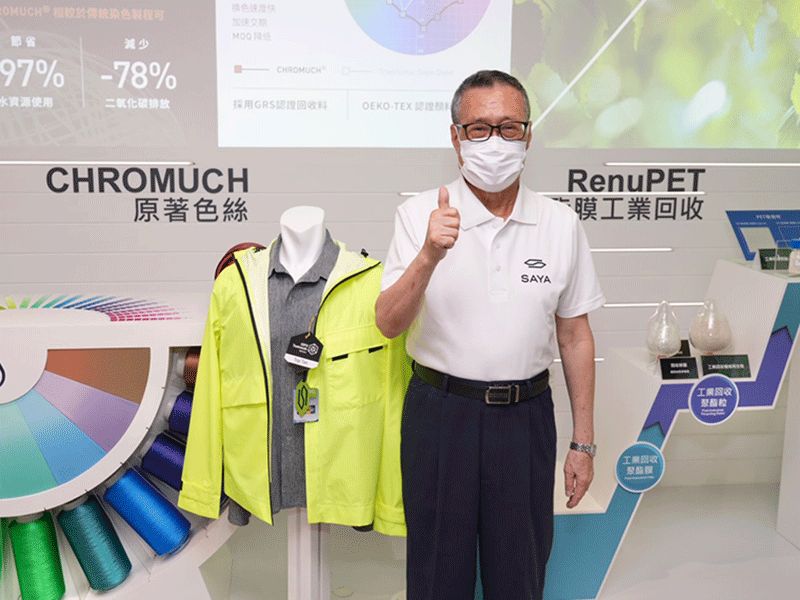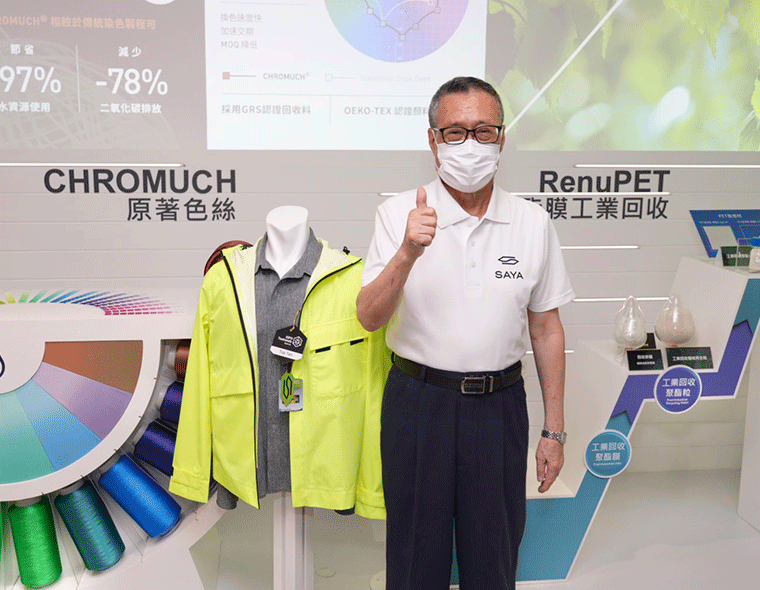Polyester products have made our daily lives a lot easier, but they have also negatively impacted the ecosystem because they cannot be properly handled after use. Since 2007, Nan Ya has dedicated itself to the recycling and regeneration of polyester products, such as plastic bottles, and has de-veloped environmental friendly products to protect the planet and promote sustainability concepts to the public.
With its advanced polyester recycling technology, Nan Ya has reduced carbon emissions by 72% compared with conventional petrochemical pro-duction methods. According to 2020-2021 statistics, Nan Ya has recycled around 14.6 billion plastic bottles in these two years, contributing to envi-ronmental protection, and thus reducing 320,000 tons of carbon emissions, which is the amount that 809 Da'an Forest Parks could absorb in a year. In addition, Nan Ya has used 90% of its recycled plastic bottles to produce high-end polyester filaments, which are harder to make and have a higher added value than the staple fiber and plastic sheet products from competi-tors.
Nan Ya has developed polyester bottle-to-textile recycling lines in Taiwan, China, Vietnam, the United States, Thailand, and the Philippines. In 2021, the capacity of Nan Ya reached around 220,000 tons, and accord-ing to estimation, it will rapidly increase to 420,000 tons in 2023.
In recent years, the “fast fashion” trend has led to a large amount of textile wastes.85% of them have either been buried or burned; as a result, Nan Ya has been actively developing textile recycling technologies. Com-bining near-infrared spectrometry with AI, Nan Ya has independently de-veloped a smart textile sorting machine by its material composition and worked with leading fashion brand to recycle overstocked fabrics, cutting wastes, and post-consumer garments, creating circular economy for the tex-tile industry. Recently, Nan Ya has also worked with Atunas, a famous brand in Taiwan for outdoor sports, and integrated fashion designers, up-stream collectors and downstream fabric manufacturers to establish the very first textile circular chain in Taiwan.
Introducing uni-material products which are easy-to-recycle and hence provide much more convenience to achieve circularity, has become a future trend. Therefore Nan Ya has initiated multiple research and develop-ment projects which contribute to sustainable product design. For instance, garment accessories such as zippers and buttons are currently not made from PET so they must be removed by labor forces when recycling gar-ments.Thus Nan Ya has mass-manufactured modified PET engineering plas-tics for fashion industry, leading garments to be entirely made from PET which facilitates their recyclability.
In addition, since most of the blinds and roman curtains on the market are made of from multiple parts with different materials (such as aluminum, PVC, and ABS) and polyester fabrics, Nan Ya has collaborated with major curtain manufacturers in Taiwan to replace non-recyclable materials with modified PET and produce curtains that are entirely made from polyester to achieve the uni-material concept.
Besides polyester product recycling, Nan Ya believes water conserva-tion is another important environmental sustainability issue. In the conven-tional dyeing and finishing process, dyeing 1 kg of fabric requires 60 liters of water. Although in recent years there have been new technologies born in the industry such as Supercritical CO2 Dyeing and Digital Printing, which aim to decrease the water consumption in conventional process. However several disadvantages are still present such as insufficient colors selection and poor hand feeling.
As Taiwan's largest colored filament manufacturer, Nan Ya has devel-oped a innovational dope dyeing technology “Chromuch®”, which has been patented. Adding dyestuffs during yarn spinning instead of applying the conventional dyeing procedure, will save 97% of water. Chromuch® provides over 1,000 colors available, delivering wider color gamut with excellent color fastness to sunlight and washing. Moreover, Nan Ya is able to introduce Chromuch® into the recycled filaments to save even more re-sources. In addition to saving energy and reducing carbon emissions, Nan Ya can also save water and reduce other environmental footprints, consis-tenting with the trend and expectations of industrial sustainability.
Nan Ya hopes that by launching these sustainable products to stimulate environmental awareness of the public to create the ripple effect, and also lead the textile industry toward carbon neutrality and net-zero emissions.



